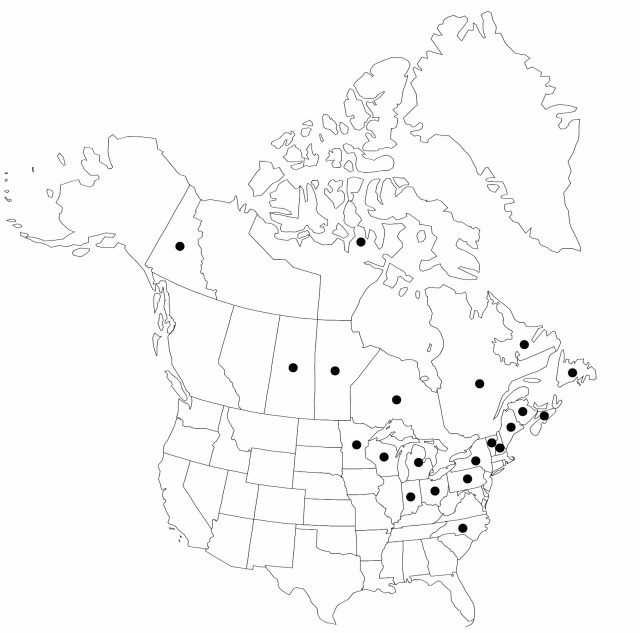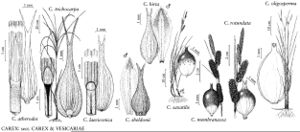Carex oligosperma
Fl. Bor.-Amer. 2: 174. 1803.
Plants loosely cespitose; rhizomes long. Culms obtusely trigonous in cross-section, 30–90 cm, smooth or scabrous-angled distally. Leaves: basal sheaths reddish purple; ligules as wide as long to wider than long; blades dark green, wiry, filiform, with involute margins, 0.5–2.5 mm wide, glabrous. Inflorescences 3–20 cm; proximal bract 3–15 (–25) cm, shorter than to exceeding inflorescence; proximal 1–2 spikes pistillate, erect, ovoid to cylindric; terminal 1 (–2) spikes staminate. Pistillate scales ovate, 3.2–5.6 × 2.6–3.8 mm, shorter than perigynia, margins entire, apex obtuse to acute, awnless. Perigynia ascending, 7–15-veined, veins extending into beak, ovate, 4–6.7 × 2.5–3.4 mm, leathery, apex tapered; beak 0.3–0.9 mm, obscurely bidentulate, glabrous, teeth straight to somewhat outcurved, to 0.3 mm. Stigmas 3. Achenes brown, trigonous, smooth.
Phenology: Fruiting summer.
Habitat: Bogs, often forming extensive stands in Sphagnum-dominated areas, poor fens, sometimes in acidic, sandy, or peaty soils in open swamps, marshes, lakeshores, riverbanks
Elevation: 0–1200 m
Distribution

Man., N.B., Nfld. and Labr., N.S., Ont., Que., Sask., Yukon, Ind., Maine, Mich., Minn., N.H., N.Y., N.C., Ohio, Pa., Vt., Wis.
Discussion
Carex oligosperma hybridizes rarely with C. rostrata.
Selected References
None.
Lower Taxa
"shortened" is not a number.
